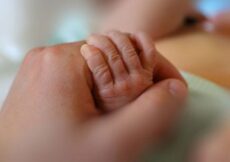Young children with a history of eating problems in the first three years of life were more likely to receive low scores on assessments of child development, according to a study by researchers at the National Institutes of Health. The findings suggest that children with multiple eating problems — frequent crying during meals, pushing food away, gagging and others — may benefit from screening for developmental delay. Early diagnosis of developmental disorders is key to getting children the help they need.
The study was conducted by Diane Putnick, Ph.D., and colleagues in the Epidemiology Branch of NIH’s Eunice Kennedy Shriver National Institute of Child Health and Human Development (NICHD).
Researchers analyzed data on more than 3,500 children from Upstate KIDS, a study of children born between 2008 and 2010 in New York State. Mothers responded to questionnaires, rating their children’s eating patterns and developmental milestones when the children were 18, 24 and 30 months old. Compared to children who did not have eating problems, children who scored high on eating problems at one or two time points were more than twice as likely to miss a developmental milestone. Children with feeding problems at all three ages were four or more times as likely to miss a milestone.
The researchers noted that feeding problems likely don’t cause developmental delay. Rather, problems associated with developmental delay, such as undiagnosed neurological issues, communication difficulties or lack of fine motor skills may underlie feeding problems. They added that feeding problems only at 18 and 24 months could potentially result from temporary variations in maturation. Children with feeding problems that persist until 30 months, however, are at greatest risk for developmental delay and are the strongest candidates for screening.
Source:
Journal reference:
Putnick, D.L., et al. (2021) Feeding problems as an indicator of developmental delay in early childhood. The Journal of Pediatrics. doi.org/10.1016/j.jpeds.2021.11.010.



































